.

CBD and Degenerative Disc Disease: What You Need to Know
Degenerative disc disease describes a host of physical and psychological factors. The umbrella term encompasses a range of spinal conditions, from stenosis to facet joint syndrome. Early research shows that CBD might play a future role in combating both the physical damage and psychological stress involved in the condition. Let's take a look.
Contents:
Back pain plagues the world as one of the leading causes of disability and chronic pain. Back pain stems from a multitude of different musculoskeletal and nervous system conditions, including degenerative disc disease (DDD). According to the World Health Organisation, all of these conditions impact a person’s well-being, quality of life, and even their ability to work.
Addressing a World Plagued by Back Pain — Where Does CBD Fit In?
Many different modalities are available to treat back pain, yet very few are scientifically validated or provide consistent results. With the search still very much ongoing for a panacea for back pain, how does cannabis fare as a viable option?
Humans have used cannabis for thousands of years in an attempt to remedy a whole host of mental and physical ailments. The resinous flowers of this fascinating herb are loaded with a rich cocktail of phytochemicals, not limited to over 100 cannabinoids and 200 terpenes. Among these, CBD—or cannabidiol—stands out as one of the most prominent.
CBD already shows promise in various clinical settings, yet the research remains early. As cannabis science continues to advance, what do we know so far about CBD's impact on DDD?
What Is Degenerative Disc Disease?
As opposed to being a specific diagnosis, DDD encompasses a group of spinal conditions that involve the degradation of intervertebral discs. These vital structures are situated in all major areas of the human spine: cervical (upper), thoracic (middle), and lumbar (lower). Overall, a total of 23 discs sit between movable vertebrae in the spine. Before we delve into the details of this spinal pathology, we need to know exactly what spinal discs are.
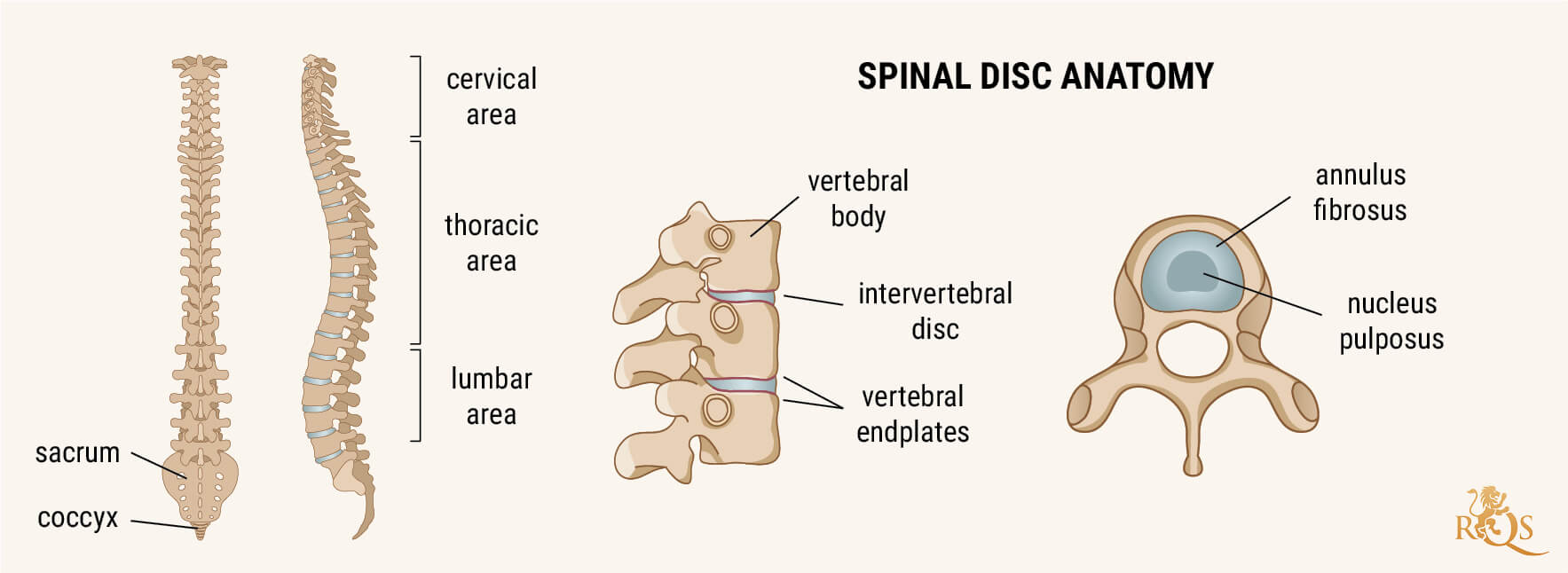
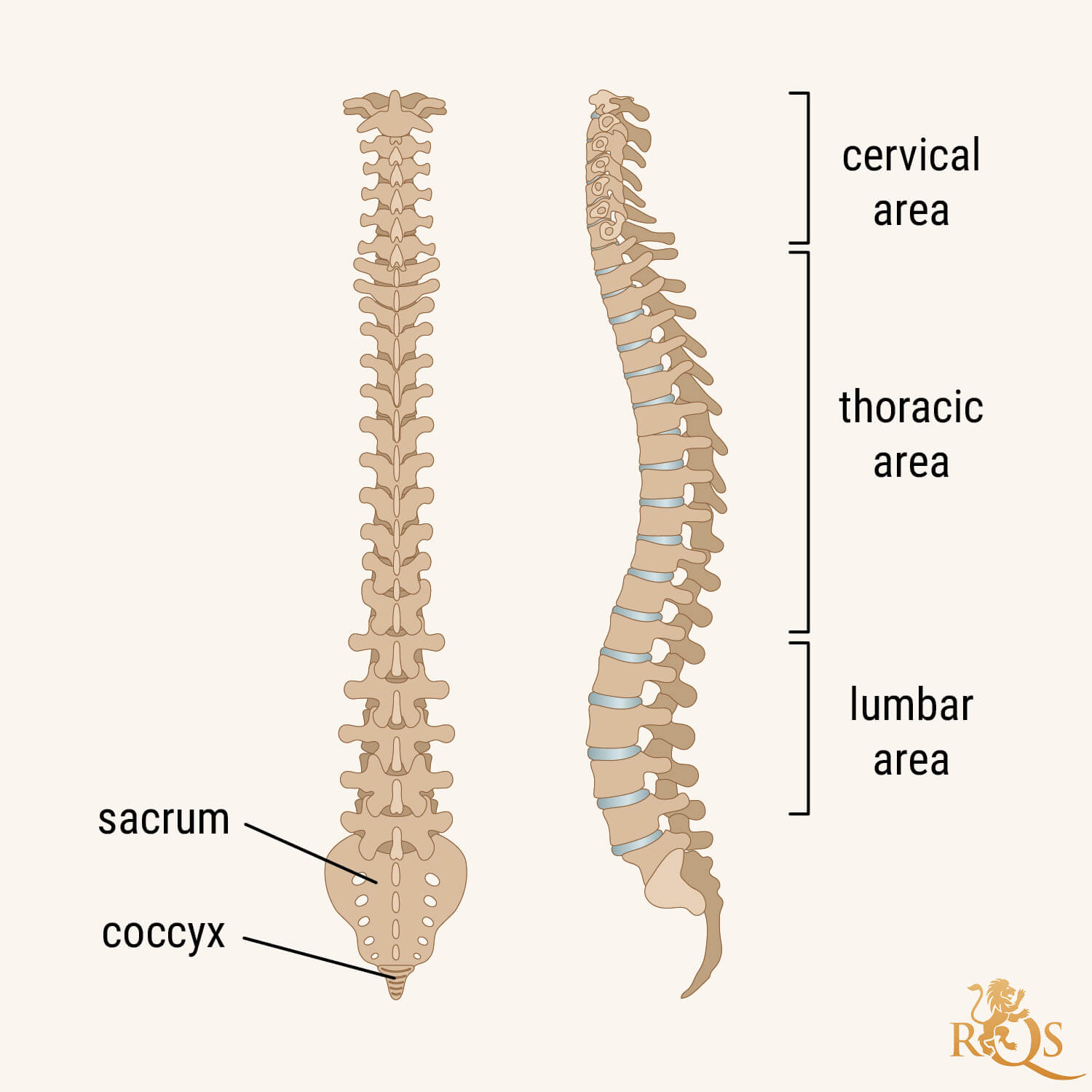
Spinal Discs: An Anatomical Overview
Intervertebral discs fulfil several critical functions within the human spine. They allow for flexible movement between each vertebra, without sacrificing strength and stability, and help to absorb shock from the ground when walking, running, jumping, and doing other activities.
When looking at spinal discs from an anatomical perspective, they’re actually quite simple. They’re made up of three distinct parts:
- Nucleus pulposus: This structure sits in the middle of the disc. Made primarily of water, the gel-like material also contains several types of collagen and allows for movement in different directions. The nucleus pulposus forms the compression-resisting unit of the spinal disc.
- Annulus fibrosus: This tough outer layer comprises several layers of collagen fibres. It's a ring of connective tissue that houses the nucleus pulposus and helps to resist excessive movement in particular directions. As opposed to resisting compression, the annulus fibrosus primarily resists tension.
- Vertebral endplate: Spinal discs sit between single vertebrae, which are stacked vertically one after the other up the spinal column. Vertebral endplates are specialised tissues positioned between each disc, connecting the two structures. They also diffuse nutrients into the discs, keeping them healthy and strong.
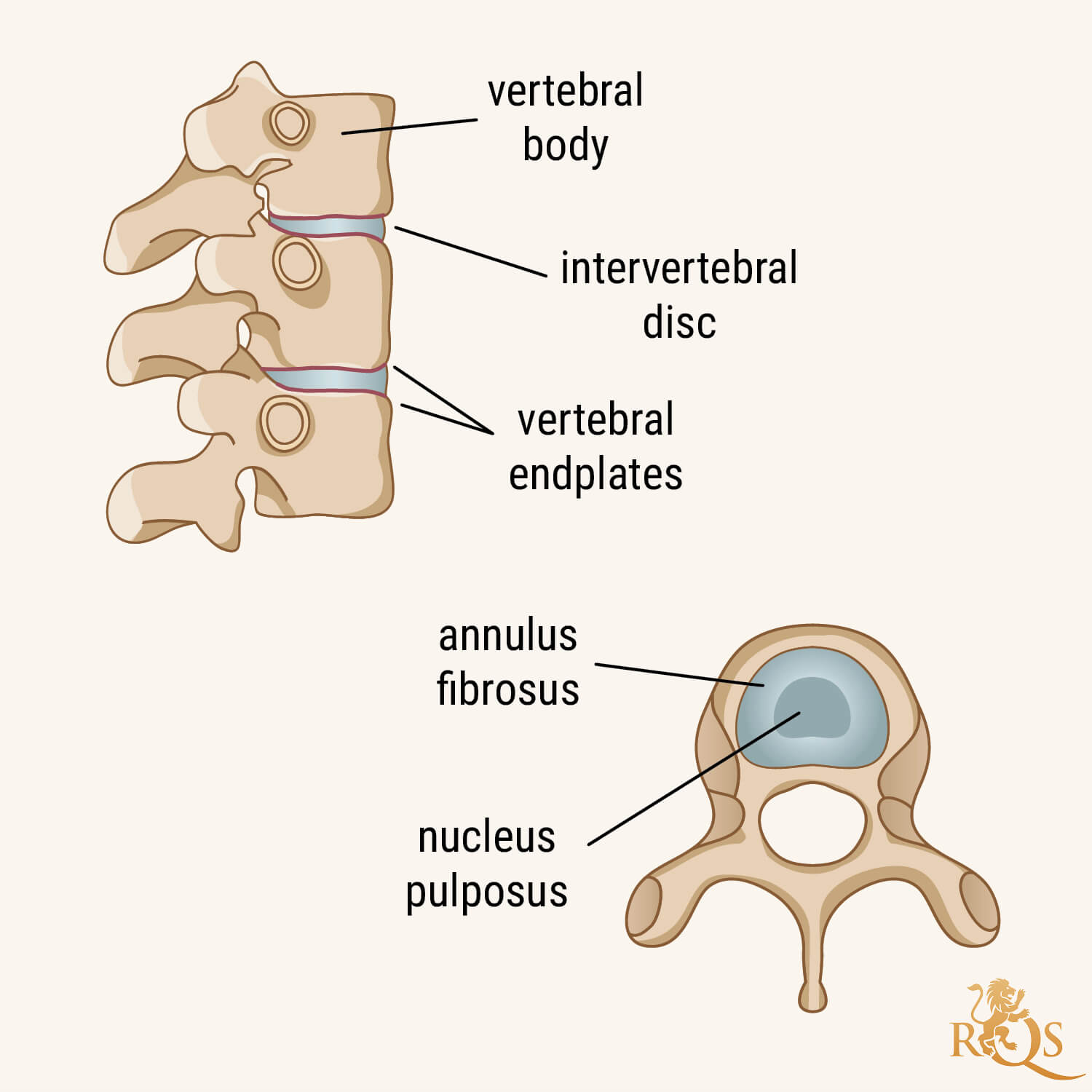
Conditions Associated With Degenerative Disc Disease
Numerous conditions fall under the umbrella term of DDD. Although they all feature distinct pathological traits, they share at least one thing in common: gradual damage to and breakdown of the spinal discs. These conditions include:
- Lumbar radiculopathy
- Osteoarthritis
- Spondylosis
- Myelopathy
- Lumbar stenosis
- Facet joint degeneration
Symptoms of Degenerative Disc Disease
DDD produces varying symptoms in patients experiencing the condition. These symptoms largely depend on the underpinning condition causing DDD, but some of them also overlap. Common symptoms include:
- Pain when bending or twisting the spine
- A “giving out” sensation that indicates spinal instability
- Muscular tension and spasms
- Shooting or stabbing pain that radiates down the arms or legs
- Loss of sensation, numbness, and tingling
Why Degenerative Disc Disease Occurs
DDD occurs through several mechanisms, ranging from genetic factors to environmental and lifestyle influences. Learn about the causative factors involved in the conditions below.
Genetics
Researchers have identified certain genes that predispose individuals to DDD. The 5A allele polymorphism increases the risk of accelerated degradation of spinal discs, particularly those located in the lower back.
Ageing
As we age, our body’s ability to heal and regenerate tissue declines. Although cell senescence and the accumulation of degraded collagen are thought to contribute to disc degeneration through ageing, a specific cause has yet to take the blame. However, we do know that the concentration of cells declines throughout the annulus fibrosus as we get older. Additionally, the cells that remain begin to lose their ability to divide and proliferate.

Mechanical Loading
Although exercise helps maintain the integrity of our muscles, bones, and other tissues, too much repetitive strain can contribute towards degradation. Occupations, sports, and other daily activities that expose the spinal discs to excessive force may increase the risk of developing DDD.
DDD: A Complex Condition With Biopsychosocial Factors
The complexity of the human body means that DDD isn’t a simple condition. Magnetic resonance imaging (MRI) investigations show that some individuals with high levels of disc degeneration experience almost no pain. Conversely, those with minimal degradation may experience severe pain.
Pain science adopts a biopsychosocial approach to treating back pain. Psychological factors such as catastrophising and fear of certain movements may enhance the perception of pain and decrease the outcomes of some interventions.
How Does CBD Help Degenerative Disc Disease?
Although exposing the body to progressive loads and fostering a healthy approach to movement are staples when it comes to rehabilitating back pain, novel interventions such as CBD also appear to have a place in future solutions.
Potential to Reduce Damage to Intervertebral Discs
Prior to 2014, there was very little research regarding CBD and DDD. This changed when a team of researchers from the University of São Paulo, Brazil, set out to investigate the effects of CBD on disc degeneration[1]. After creating a model of DDD in mice, they administered varying doses of CBD to an experimental group shortly after.
The researchers used MRI to observe the effects of CBD both two and fifteen days after administration. After obtaining images, they also looked at the injury sites on a cellular level using histological analysis. They found that CBD managed to significantly reduce the damage caused to the intervertebral discs. The cannabinoid displayed particularly impressive effects within the annulus fibrosus. However, the changes in the nucleus pulposus were less significant.
CBD Interfaces With the ECS and Raises Anandamide Levels
But, how exactly does CBD exert these positive changes? Well, the molecule works on numerous systems throughout the body to create physiological shifts. For example, CBD interfaces with the endocannabinoid system (ECS). The ECS features two types of receptors—CB1 and CB2—found all throughout the body, with particularly high concentrations in the nervous system and immune system, respectively.
CBD may help to reduce disc damage by interacting with these receptors, although research has yet to find them located within the intervertebral discs. CBD also prevents the degradation of the endocannabinoid anandamide, which allows it to linger in the body for longer. This endocannabinoid—also known as the “bliss molecule”—displays pain-killing and anti-inflammatory effects that might play a role in disc healing.
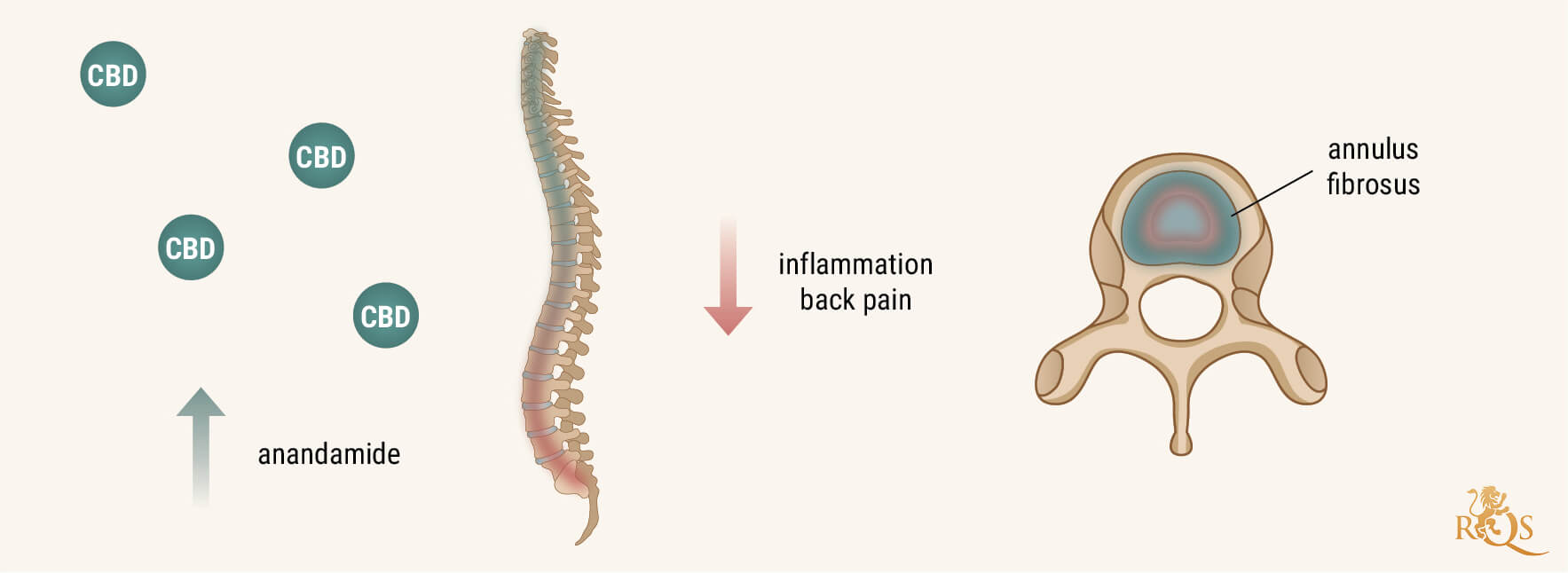
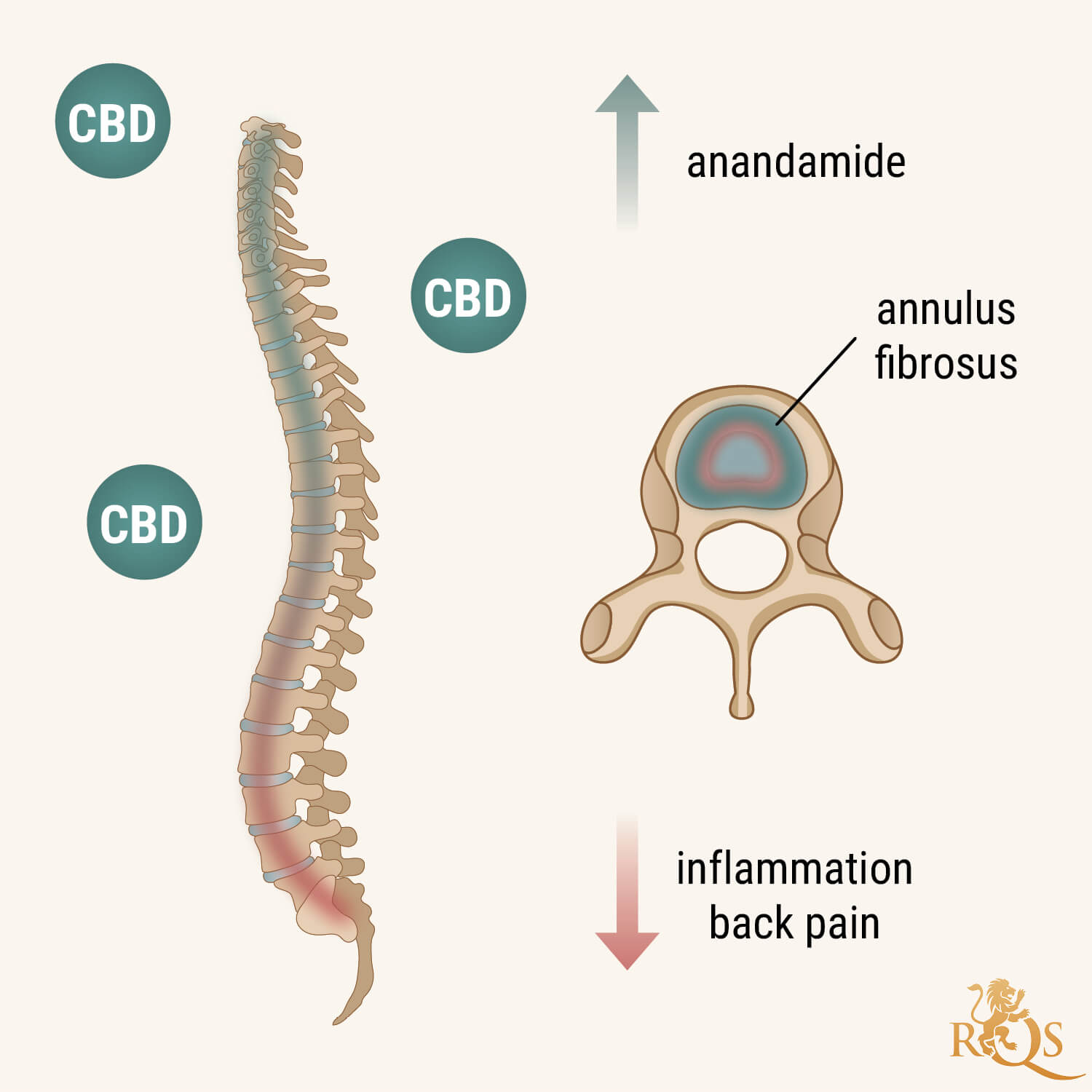
Potential to Reduce Inflammation
Because degenerative disc disease involves the release of a flurry of inflammatory molecules, cannabis scientists are looking to see if CBD offers any anti-inflammatory action. A 2014 study in PLOS One set out to see if the cannabinoid offered any protective effects[2] against intervertebral disc degeneration in rats.
Despite their rigorous efforts, the research team called for further investigations into the mechanism by which CBD interacts with cell signals. Clinical trials are also required to see how the cannabinoid works in people living with the condition.
CBD for Psychological Symptoms of Degenerative Disc Disease
The treatment of back pain requires a multi-pronged approach. Although manual therapy, strength training, and specialised exercises play a key role, the psychological state of patients heavily influences their perception of pain and their ability to deal with the condition.
The psychological impact of DDD and chronic pain may lead to negative mental states such as depression, anxiety, and catastrophisation. As well as potentially helping to address the physical aspects of DDD, cannabidiol might help to reduce psychological symptoms.
Early research shows promise when it comes to CBD and our mental state. The cannabinoid interacts with the serotonin system, which may change the way our brain reacts to this key neurotransmitter. This, in turn, could have a profound impact on our mental state. And, as alluded to earlier, CBD keeps anandamide—a molecule associated with increased mood—in the synaptic space for a longer period[3].
Research also suggests that CBD may help to reduce symptoms of stress[4]. Interestingly, excess stress may change the way we perceive and deal with pain[5]. The psychological state appears to fuel and stem from chronic pain conditions, possibly giving rise to a cycle of suffering. CBD may help to alleviate some symptoms of stress and thereby shift the perception of pain and its impact.
How to Use CBD for Degenerative Disc Disease?
To put it simply, no clear-cut answer exists to this question. The research surrounding the impact of CBD on DDD remains extremely early and underdeveloped. With no clinical trials to use as a foundation, nobody knows the optimal dose or method surrounding the use of CBD for the condition.
Using CBD to tackle symptoms of DDD remains an experimental approach. However, some users find that cannabidiol helps them in one way or another. Of course, always consult your doctor before doing so.
Which CBD Products to Choose?
If you choose to use CBD, we highly suggest sourcing the best products possible. With a saturated market, the quality of CBD oil fluctuates wildly. Although many good products exist, there are many others that are untested and unreliable.
When it comes to buying CBD oil, we recommend looking for three distinct characteristics. First of all, seek full-spectrum oils. These products incorporate all of the beneficial phytochemicals within cannabis—not just CBD. They utilise other cannabinoids, terpenes, and flavonoids to create a synergistic blend of chemicals[6] that produce more pronounced effects.
Second, look for products that use supercritical CO₂ extraction. This state-of-the-art method captures all of the desired phytochemicals while leaving everything else behind. CO₂ extraction also removes the risk of harmful solvent residue.
Third, we recommend only buying third-party lab-tested products. This way, you’ll know exactly what your bottle contains. This type of testing guarantees a clean product free of contaminants, and one that stays within the regulated limits of THC quantity.
The Future for CBD and Degenerative Disc Disease
Degenerative disc disease remains a controversial and complex condition. We know that pain doesn’t equate to tissue damage. A person with no physical disc damage may feel pain, while a person with no pain may have significantly degenerated discs. Plus, those that feel pain are likely to experience negative mental states such as fear of certain movements and catastrophisation.
Although the research remains far too early to make solid conclusions, the cannabinoid shows great promise as part of a holistic approach involving exercise and psychological intervention. Hopefully, further studies will start to unveil CBD’s physiological effects on the condition, as well as the dose and administration method required.
- Protective Effects of Cannabidiol on Lesion-Induced Intervertebral Disc Degeneration https://www.ncbi.nlm.nih.gov
- Protective Effects of Cannabidiol on Lesion-Induced Intervertebral Disc Degeneration https://www.ncbi.nlm.nih.gov
- Cannabidiol enhances anandamide signaling and alleviates psychotic symptoms of schizophrenia https://www.ncbi.nlm.nih.gov
- Translational Investigation of the Therapeutic Potential of Cannabidiol (CBD): Toward a New Age https://www.ncbi.nlm.nih.gov
- Chronic Pain, Chronic Stress and Depression: Coincidence or Consequence? https://www.m-r-i.net
- Taming THC: potential cannabis synergy and phytocannabinoid-terpenoid entourage effects https://www.ncbi.nlm.nih.gov

































